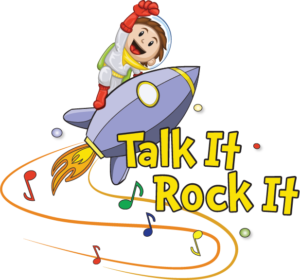
I believe strongly in using speech therapy songs for toddlers. I worked with children in early intervention for over 25 years. I observed the joys and concerns that parents felt when trying to help their toddlers communicate. Parents always asked, “How do I help my 2-year-old with speech therapy?” or “How can I help my toddler with speech at home?” Because every child is different and the range of speech and language disorders is huge, I would always ask very specific questions of their child’s needs and struggles. One general strategy that I would tell a parent is this – Do it with a song! I have found that music immensely helps speech and language development. Here are some winning strategies for speech therapy songs for toddlers. Specifically, using a song can improve these skills:
Improving a child’s attention, regulation, and engagement –
I often say, if a child is not attentive or regulated, he or she cannot learn effectively. A song can give children a sense of calm and predictability. When a child is regulated or calm, he can attend and engage in whatever activity you are doing.
I have taught parents countless songs to use during difficult routines such as diaper changing, tooth brushing, or getting in a car seat. Not only does a song help a child to stay calm, but it also helps the child learn words related to that routine. You may want to create your own song that depicts the steps involved in any activity.
Brush My Teeth
For example, I wrote this song to help a child stay regulated while brushing his teeth:
I brush my teeth in the morning. I brush my teeth at night.
I brush and brush and brush and brush, to make them clean and bright.
I brush my teeth on the bottom. I brush my teeth on top.
I brush and brush and brush and brush and brush until I stop!
Children will be able to understand the language of these daily routines and be able to stay regulated. Children will know that the song indicates a beginning of an activity and also tells him when the activity ends. That anticipation helps keep a child calm.
Understanding language –
A song tends to be repetitive and can therefore be great for teaching new vocabulary, verbal directions, or questions. A song is great for learning body parts, action words, animals and animal sounds, and any other vocabulary word that is important in a child’s life.
Repetition is the key. Children love to have consistency and repetition so don’t worry about singing the same song over and over again. For example, I have written a song to the tune, Skip to my Lou, entitled, What’s That? This question is repeated 36 times and gives children the repetition needed to understand the question and learn how to answer it.
All of the songs I have written feature vocabulary that is child oriented. You can listen to song samples on the shopping page of TalkItRockIt.com here and read the goals of each song.
Imitation of actions and gestures –
Before children learn to talk, we want them to use gestures to communicate. Imitation of gross motor movements as in the photo above are easily practiced using a song. Songs like The Wheels on the Bus, 5 Monkeys Jumping on the Bed, Twinkle Twinkle Little Star, and other classic children’s songs are excellent for gesture imitation. I find that, depending on the child’s ability to imitate gestures, some songs such as Walking Elephants from our Animals Movin’ and Groovin’ Song Set, are the easiest. If your child has a favorite song, include some gestures while singing the song.
Imitation of sounds, words, and phrases –
Some children need lots of verbal practice to improve speech. Songs can be magical. In fact, I wrote songs specifically because I could not find songs with simple verbal practice in mind. My songs encourage imitation of vowels, animal sounds, noises, speech sounds, sound combinations such as consonant-vowels (CV), CVCV, single words, and phrases. Talk It Rock It songs are unique in they are written specifically to give children speech practice. The rate is slower to give kids time to respond. Our songs include the phrase, “your turn,” featuring adults and kids taking verbal turns. Our songs also contain endless repetition, making them great for early talkers.
If you want to enhance a child’s speech and language skills, do it with a song! Check out my You Tube channel here for ideas and songs.


